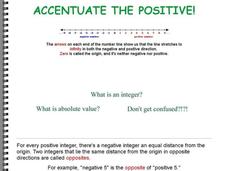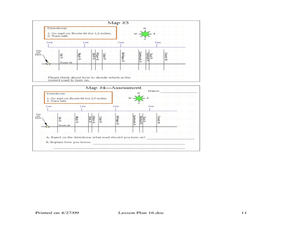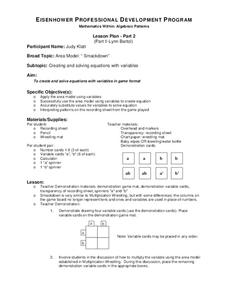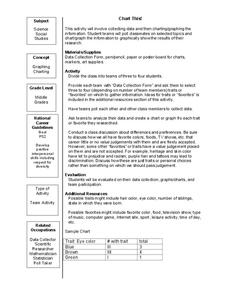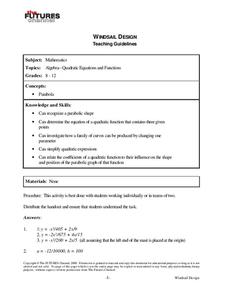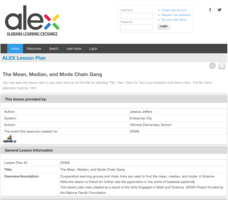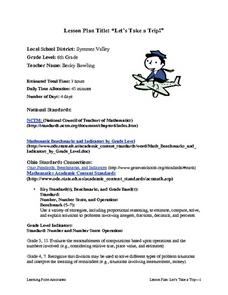Curated OER
Common Sense Cookie Shop
First graders shop for a bag of cookies using toy money. In teams, they choose which variety to buy and decides which bills and coins are necessary to buy the bag of cookies and a cashier makes change. They tally the cookies purchased...
Curated OER
Accentuate the Positive!
Students participate in an interactive online activity about adding, subtracting, multiplying, and dividing positive and negative integers. Students look at sample problems through out the activity and have the opportunity to complete ...
Curated OER
Where Should You Turn?
Fourth graders complete activities to study decimal numbers. In this decimal numbers lesson plan, 4th graders study decimal numbers to express numbers less than one and intervals. Students complete map and location activities to study...
Pennsylvania Department of Education
What Balances?
Students explore another meaning of subtraction as it pertains to the inverse of addition. In this what balances lesson, students identify the concept of subtraction as a balance. Students use subtraction facts to generate addition...
Pennsylvania Department of Education
Seeing Doubles
Young scholars work with dominoes to recognize the number of spots on each side as they relate to addition facts. In this seeing doubles lesson, students make triangle shaped flash cards for the double facts. Young scholars represent the...
Pennsylvania Department of Education
Multiple Patterns
Students explore patterns that involve doubling numbers. In this multiple patterns lesson, students use objects to explore these patterns while recording them using a table. Students recognize even and odd number patterns while applying...
Education World
High, Low, or In Between?
Trios play a card game that reinforces the concepts of number sequence and greater than and less than. Scholars make predictions based on information they know and a single unknown. They see cards drawn by others in the group, but not...
Curated OER
Mathematics Within: Algebraic Patterns
Students analyze problem solving techniques for equations with variables by playing a game called "Smackdown". They place variable cards on a grid and use the area model to calculate an answer after spinning a game piece to determine the...
Curated OER
Greater Than, Less Than, Equal to
First graders complete number comparison activities. In this number comparisons lesson plan, 1st graders review the names of comparison symbols and participate in visual comparison activities. Students practice using the gator and clam...
Curated OER
Points In the X-Y Plane
Young scholars plot points on the x-y plane using x and y coordinates and describe how the x and y values relate to the position of the point on the plane. They plot points that fit a linear relationship. They explain that their...
Curated OER
Points in the X-Y Plane
Young scholars plot points on the x-y plane using x and y coordinates. They describe how the x and y values relate to the position of the point on the plane. Finally, students plot points that fit a linear relationship and summarize that...
Curated OER
Chart This!
Students collect data and graph or chart the information. In this data organization lesson, students poll their classmates about certain topics and chart or graph the information to show the results of their research.
Curated OER
Physics: Visualization of Hydrogen Wave Functions
Students explore various methods for visualizing the results of hydrogen wave function. They observe trends using a polar plot tool and make plots for the first three energy levels of the radial wave function for hydrogen. Students apply...
Curated OER
Graphing Data on Ellis Island
Third graders use data to make a bar graph. In this graphing and social studies lesson, 3rd graders use data about where Ellis Island immigrants came from to complete a bar graph on Microsoft Excel.
Curated OER
Windsail Design
Students fit quadratic models to windsail designs. For this fitting quadratic models to windsail designs lesson, students compare quadratic models of sails with different measurements and mast size. Students vary the a-value for a sail...
Curated OER
Investigating Division
Students develop math sense as they multiply and divide numbers. In this algebra lesson, students identify the missing numbers in a multiplication and division problem. They use a calculator to help them solve the problems.
Alabama Learning Exchange
The Mean, Median, and Mode Chain Gang
Students analyze a set of data. They work in cooperative groups and use chain links to identify the mean, median, and mode of the chain.
Alabama Learning Exchange
Watch That Plant Grow
Middle schoolers examine the growth of marigolds in a greenhouse environment. They chart data in spreadsheets showing plant growth over time and under a number of conditions. They record measures of plant height and greenhouse temperature.
Curated OER
Let's Take a Trip!
Sixth graders plan a trip for a family of four choosing their travel plan by studying maps to decide upon a route and visiting Websites to get airline and travel schedules. They use ratios and proportions as well as converting fractions...
Curated OER
The Secret of the Crystal Ball
Eighth graders use mathematical expressions to solve problems. In this basic properties of operations, 8th graders use prior knowledge and logical reasoning to solve equations. Students analyze an equation by solving a trick problem to...
Curated OER
Popcorn Geography
Students use kernels to create a "Top Corn-Producing States" map or graph. They read and round off numbers. Students identify on a U.S. outline map the location of corn-growing states. They create a visual (map or graph) illustration...
Curated OER
Art and Anatomy: The Vitruvian Teen
Twelfth graders create an artistic version of a Vetruvian teen. For this anatomy lesson, 12th graders design an experiment to test the theory of the ideally proportioned man. They present their findings in class.
Curated OER
It's Alive! Using Microorganisms in Cooking
Students create a KWL chart about food. In this chemistry lesson, students differentiate physical and chemical changes. They explain how microorganisms are used in food preparation.




